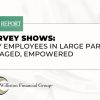
As a buyer’s agent, I think knowing the answers to buyer questions and concerns that emerge is essential to conveying our experience and knowledge of the process. Amy Buynoski, vice president and mortgage banker at Fidelity Bank, has 12 years of experience in getting loan successfully to the closing table. I asked Amy how she’d manage few of the questions that seem to come up from buyers who have been through the process in the past but might not have bought since the recession.
If the appraised value of the new home a buyer is purchasing is higher than the purchase price, can we use the value instead of the purchase price to determine the down payment?
At the time of purchase, we would use the lesser of the purchase price or appraised value. You would buy the home with equity, and it would not affect the amount you would have to put down on our new home.
Why might a buyer be required to pay private mortgage insurance (MI)?
Borrowers have to pay MI if they do not put 20 percent down. This insurance protects the bank if the buyer defaults on the loan and the property forecloses. The private MI company will pay the lender for the amount owed on the loan if that happens.
Is it an issue if the buyer is self-employed and writes off a lot of expenses?
This is not a problem at all. It may require a little extra paperwork from the buyer’s accountant. Depending on how the buyer has structured the business, your lender may need business tax returns as well as personal returns for the last two years.
Why do banks check with the Internal Revenue Service (IRS) to see whether the buyer filed taxes when the buyer has provided copies of tax returns to the bank?
Federal law requires that tax returns are filed with the IRS. Mortgage lenders must also verify with the IRS that the returns have been submitted and that the information provided to the lender matches what has been submitted and validated by the IRS.
Why do lenders monitor a buyer’s credit throughout the process?
Credit is monitored throughout the process to ensure that the buyer has not opened any new debt. For example, we want to ensure the Buyer has not made large purchases and secured new debt for furniture or an appliance, or perhaps bought a new car, which could affect the buyer’s ability to qualify for a new home loan. This also protects the consumer because failing to monitor credit could prevent the loan from closing, which could result in a loss of earnest money!
What if the buyer’s ex-partner pays the mortgage on the home they shared? Even if the buyer is on the loan, can this be excluded from the buyer’s debt to qualify for a mortgage?
We can omit the mortgage payment providing the Buyer has a court document to support that this arrangement is part of the divorce agreement.
The buyer had a short sale. When can they purchase again?
If you had a short sale, you may be eligible sooner than you think to buy again. You can finance a new home three years after the short sale has closed. We would require a copy of the Department of Housing and Urban Development document from when you sold your home as a short sale.
What about foreclosure? When can the buyer purchase again?
You can purchase a home and get financing through the Federal Housing Administration with 3.5 percent down three years from the date your home was sold on the courthouse steps. We would need to document the date your home was sold on the courthouse steps.
Can the buyer receive a gift for a down payment?
Yes, you can receive a gift from a family member. It has to be an immediate member of your family. Gifts are acceptable from parents, grandparents, brothers, sisters, children, cousins, spouses and fiances. We do not allow gifts from friends. We do have a gift letter that will be sent for you and the person giving you a gift to sign, and the donor of the gift will also have to document that they have ability to give you a gift.
Are there any first-time homebuyer programs available?
We do have several programs that are available for first-time home buyers. To qualify, you cannot have owned a home in the last three years, and the programs are also based on the household income and how many people live in the house. Children are included in the number of people who live in the home.
What programs are available for veterans?
Veterans are able to finance up to 100 percent of the purchase price in most cases. Veterans also finance a fee at the time of closing and do not have to pay private mortgage insurance.
I like working with lenders who have the ability and experience to think like an underwriter. In the same sense, I think knowing how to answer questions about every aspect of the buying process allows a good agent to advise buyers appropriately. It cuts down on the confusion and helps point buyers in the direction they need to go to make the process run smoothly!
Hank Bailey is an associate broker with Re/Max Legends and a Realtor for more than a decade who provides buyer’s agent representation and seller listing services related to residential real estate.
The post 11 mortgage FAQs from returning buyers (and how to answer them) appeared first on WFG National Title Insurance Company.





